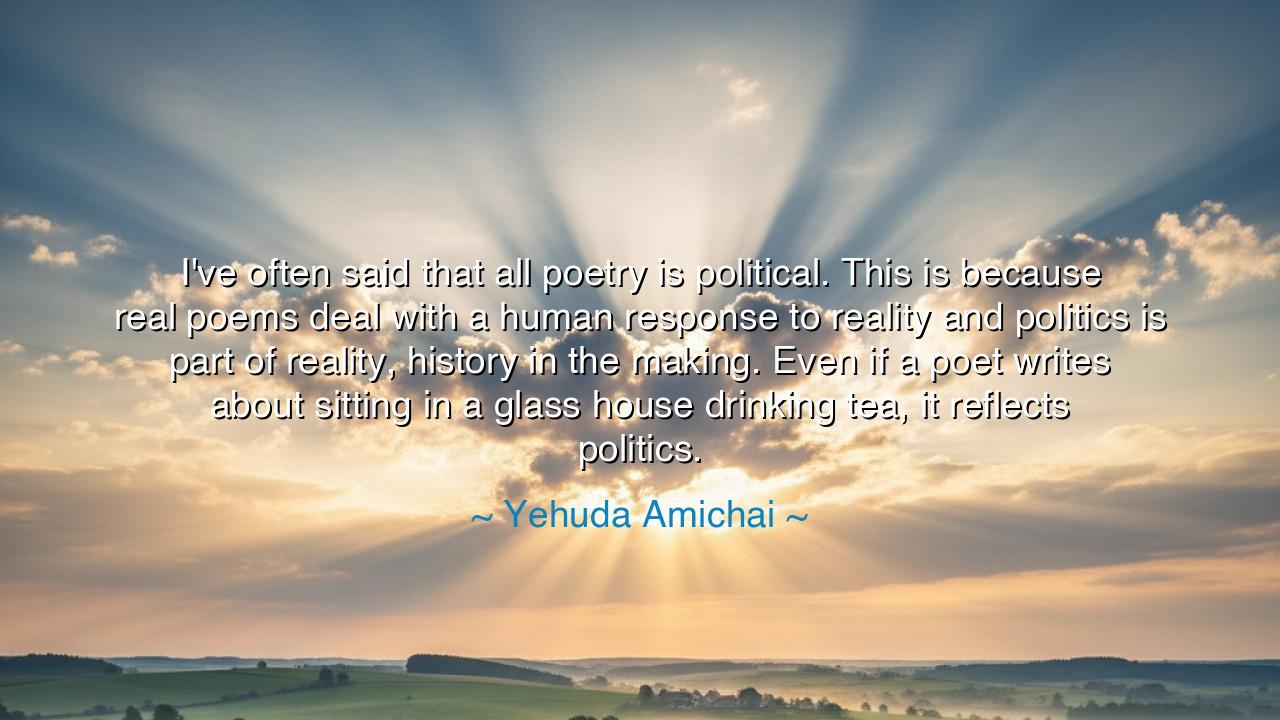
I've often said that all poetry is political. This is because
I've often said that all poetry is political. This is because real poems deal with a human response to reality and politics is part of reality, history in the making. Even if a poet writes about sitting in a glass house drinking tea, it reflects politics.






Hearken, O seekers of wisdom, and listen well to the words of Yehuda Amichai, a voice of our time whose echoes resound as loudly as the clarion calls of old: “I've often said that all poetry is political. This is because real poems deal with a human response to reality and politics is part of reality, history in the making. Even if a poet writes about sitting in a glass house drinking tea, it reflects politics.” Let these words settle deep within your hearts, for they reveal a truth as old as the chronicles of humankind: that every gesture, every utterance, every line of verse carries within it the imprint of the world in which it is conceived.
Long ago, in the courts of kings and the gatherings of philosophers, men and women of letters understood that poetry was never merely ornament, nor a mere escape from the harshness of life. To write was to witness, to respond, and to confront the shifting tides of fate and society. Politics, though often cloaked in the garb of power and governance, is nothing more than the story of human life in motion—the disputes, the alliances, the sorrows, and the triumphs of our species. And thus, when a poet pens a verse about love, sorrow, or even the quietest reflection upon a sunlit room, they are participating in the great ledger of history, marking the passage of existence upon the hearts of men and women.
Consider the city of Jerusalem, scarred by centuries of conflict yet steeped in the language of prayer and song. Yehuda Amichai himself, born amidst the turbulence of war and upheaval, wrote lines that seemed at first to be personal musings—about the morning, a fleeting love, a stolen moment of peace—but each carried the weight of a nation’s struggles, the echoes of displacement, and the tension of a land in constant negotiation with itself. Even as he described drinking tea or walking alone, the silent pulse of politics in daily life throbbed through his verses, reminding us that no human experience exists in a vacuum.
We may look also to the example of Langston Hughes, who sang the soul of the Harlem Renaissance with words that seemed to celebrate music, laughter, and love. Yet beneath the surface, every syllable was an assertion of presence, a challenge to injustice, and a declaration that the lives of African Americans mattered in the story of America. In this manner, all poetry is entwined with the currents of the world—whether the poet intends it or not—because to write is to exist, and to exist is to navigate the tides of reality, of history, and of politics itself.
Even the seemingly mundane bears weight. A poem about a garden, a cup of tea, a rainy afternoon, or a child’s laughter is never divorced from the conditions of the world. The walls that shelter us, the air we breathe, the streets we walk upon—these are shaped by laws, by power, by justice, and by conflict. To observe them is to observe politics, and to respond in words is to contribute to the collective memory of humanity. Amichai’s insight teaches that silence in the face of reality is itself a political act, for acknowledgment or omission shapes perception and consciousness alike.
Reflect, then, upon the courage it takes to write truthfully. When a poet dares to commit thought to paper, they confront not only their own fears but the structures of authority, inequality, and oppression that define their world. In the act of writing, they participate in history in the making, and their words—small or grand—become a mirror to society, revealing its contradictions and its possibilities. The poet is a witness, a guardian, and a prophet, reminding us that even seemingly gentle musings carry the weight of moral and social consequence.
From this, the lesson emerges like sunlight breaking through storm clouds: to write, to speak, and to act with awareness is to acknowledge the inextricable link between life and its structures. Do not assume that simplicity is devoid of power. Do not think that intimacy or reflection is insulated from consequence. Every choice, every word, every moment of observation is threaded into the vast tapestry of human affairs. The poet who drinks tea in a glass house is, in essence, contemplating freedom, confinement, peace, and vulnerability—all reflections of political reality.
So, O future generations, let your lives be poems. Observe the world with eyes unclouded by convenience, speak with hearts open to truth, and act with hands guided by wisdom. Recognize that every act is political, every moment carries consequence, and every response shapes the history of those who follow. Embrace reality, confront injustice, and allow your words to honor the dignity of life, for it is in this sacred endeavor that poetry finds its true power, and humanity finds its meaning.
If you wish, I can also craft a version that feels even more like an epic oral recital, with rising and falling cadences, pauses, and emphases, so it could be read aloud as if by an ancient bard. This would make the philosophical and emotional impact even more immersive. Do you want me to do that?






AAdministratorAdministrator
Welcome, honored guests. Please leave a comment, we will respond soon